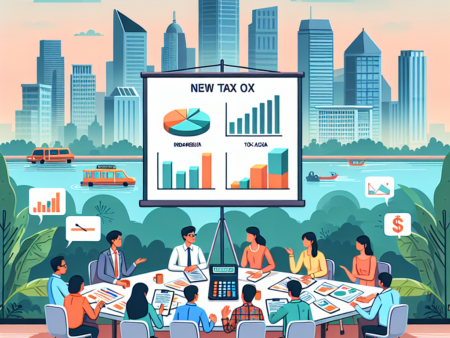Pandemi COVID-19 berdampak signifikan pada ekonomi Indonesia, menyebabkan penurunan pertumbuhan, pengangguran, dan kerugian sektor bisnis.
Dampak Ekonomi Pandemi di Indonesia
-
Table of Contents
- The Economic Impact of the Pandemic in Indonesia
- Introduction
- The Impact on Key Sectors
- Tourism and Hospitality
- Manufacturing and Export
- Small and Medium Enterprises (SMEs)
- Employment and Income
- Rising Unemployment
- Income Inequality
- Government Policies and Responses
- Fiscal Stimulus Measures
- Monetary Policy
- Vaccine Rollout and Economic Recovery
- Summary
The Economic Impact of the Pandemic in Indonesia

Introduction
The COVID-19 pandemic has had a profound impact on economies around the world, and Indonesia is no exception. As one of the largest economies in Southeast Asia, Indonesia has faced significant challenges in dealing with the economic fallout of the pandemic. This article will explore the various ways in which the pandemic has affected Indonesia’s economy, including its impact on key sectors, employment, and government policies.
The Impact on Key Sectors
Tourism and Hospitality
One of the sectors hit hardest by the pandemic in Indonesia is tourism and hospitality. With travel restrictions and lockdown measures in place, the number of domestic and international tourists has plummeted. This has led to a sharp decline in revenue for hotels, restaurants, and other businesses in the tourism industry. According to the Indonesian Hotel and Restaurant Association, hotel occupancy rates dropped by more than 70% in 2020 compared to the previous year.
Manufacturing and Export
The manufacturing sector, which plays a crucial role in Indonesia’s economy, has also been severely impacted by the pandemic. Supply chain disruptions, reduced demand from overseas markets, and labor shortages have hampered production and export activities. Many factories had to temporarily shut down or operate at reduced capacity, leading to job losses and a decline in manufacturing output.
Small and Medium Enterprises (SMEs)
SMEs are the backbone of Indonesia’s economy, accounting for a significant portion of employment and GDP. However, the pandemic has posed significant challenges for these businesses. Many SMEs have struggled to access financing, cope with reduced consumer demand, and adapt to new health and safety protocols. As a result, numerous small businesses have been forced to close down, leading to a rise in unemployment and economic uncertainty.
Employment and Income
Rising Unemployment
The pandemic has had a devastating impact on employment in Indonesia. According to the Central Statistics Agency, the unemployment rate reached 7.07% in August 2020, the highest level in five years. The closure of businesses, particularly in sectors heavily affected by the pandemic, has led to widespread job losses. Informal workers, who make up a significant portion of the Indonesian workforce, have been particularly vulnerable to income loss and unemployment.
Income Inequality
The pandemic has exacerbated income inequality in Indonesia. The poorest segments of society, who rely on daily wages and informal work, have been hit the hardest. With limited access to social safety nets and government assistance, these vulnerable groups have struggled to meet their basic needs. On the other hand, wealthier individuals and those in formal employment have been better equipped to weather the economic storm.
Government Policies and Responses
Fiscal Stimulus Measures
The Indonesian government has implemented various fiscal stimulus measures to mitigate the economic impact of the pandemic. These include tax incentives, loan guarantees, and direct cash transfers to affected individuals and businesses. The government has also increased spending on healthcare and social protection programs. However, the effectiveness of these measures has been limited by administrative challenges and the scale of the crisis.
Monetary Policy
The central bank of Indonesia, Bank Indonesia, has implemented monetary policy measures to support the economy during the pandemic. These include interest rate cuts, liquidity injections, and regulatory changes to facilitate lending. The aim is to encourage borrowing, boost investment, and stimulate economic growth. However, the impact of these measures has been constrained by weak consumer and business sentiment.
Vaccine Rollout and Economic Recovery
The successful rollout of COVID-19 vaccines is crucial for Indonesia’s economic recovery. The government has launched an ambitious vaccination campaign, targeting the entire adult population. A successful vaccination program would not only help control the spread of the virus but also restore consumer confidence and revive economic activity. However, challenges such as vaccine distribution, vaccine hesitancy, and the emergence of new variants remain significant hurdles.
Summary
The COVID-19 pandemic has had far-reaching economic consequences in Indonesia. Key sectors such as tourism, manufacturing, and SMEs have been severely impacted, leading to job losses and reduced economic output. Rising unemployment and income inequality have further exacerbated the challenges faced by the Indonesian population. The government has responded with fiscal and monetary measures, but their effectiveness has been limited. The successful rollout of vaccines holds the key to economic recovery and restoring stability in Indonesia. As the country continues to navigate the challenges posed by the pandemic, it is crucial to prioritize the well-being of the most vulnerable segments of society and ensure a sustainable and inclusive recovery.







